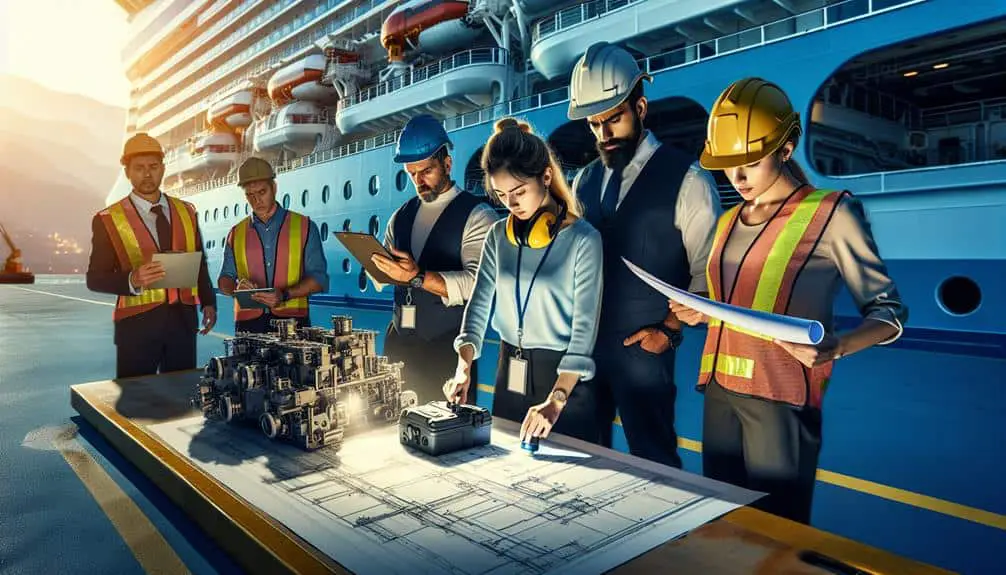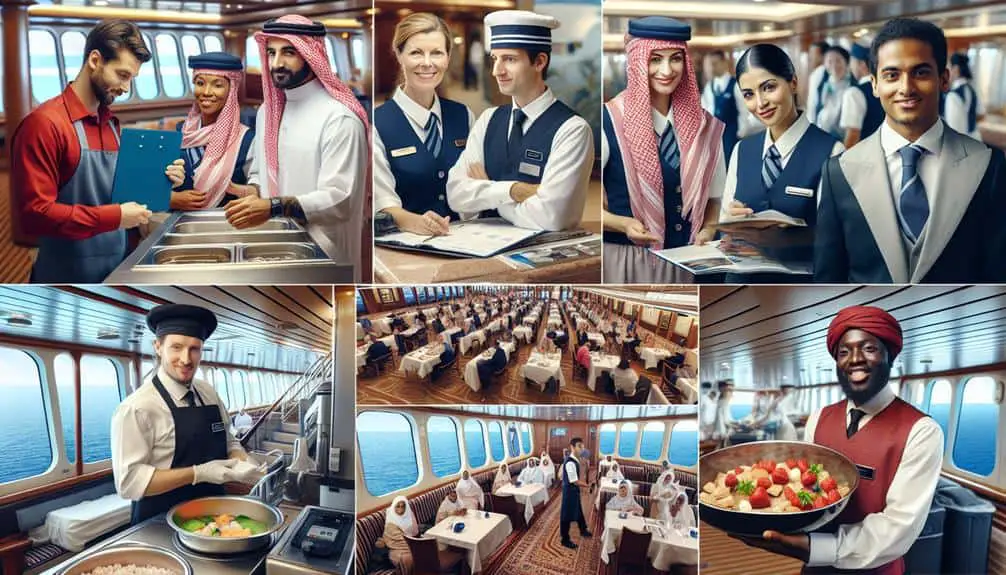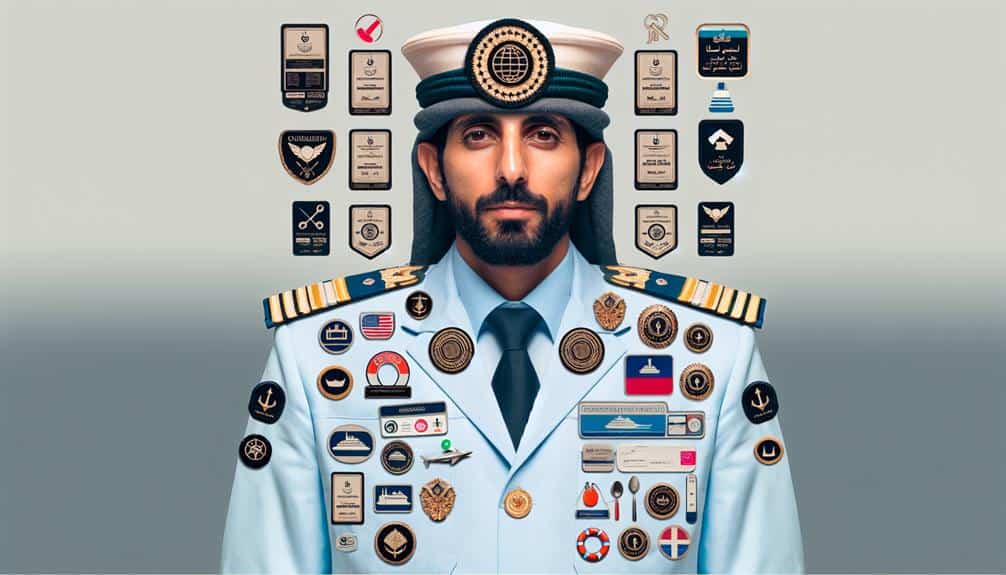Optimize engineering crew responsibilities on cruise ships by focusing on efficient machinery operations. Monitor fuel consumption, engine performance, and guarantee training in maintenance and emergency protocols. Conduct regular assessments to fine-tune operations. Implement safety protocols rigorously, including drills and risk assessments. Maintain critical systems with preventive maintenance schedules and spare parts inventory. Prepare crew for emergencies through regular drills and effective communication strategies. Foster team collaboration through structured frameworks, meetings, and cross-training. By strategically incorporating these elements, you can guarantee the smooth operation and safety of your cruise ship. Further insights on enhancing crew performance await.
Key Points
- Implement performance metrics for monitoring fuel consumption and propulsion efficiency.
- Conduct regular training programs on engine maintenance and issue troubleshooting.
- Utilize hands-on training and simulations to enhance problem-solving abilities.
- Optimize machinery operations through regular assessments and data analysis.
- Focus on safety protocols, hazard identification, and clear communication for crew well-being.
Efficient Machinery Operations
To guarantee smooth sailing and peak performance, the engineering crew on cruise ships must carefully oversee and execute effective machinery operations. Performance metrics play a vital role in this aspect. By monitoring key indicators such as fuel consumption, engine temperature, and propulsion efficiency, the crew can optimize the ship's performance and secure a seamless voyage for passengers.
Training programs are essential to equip crew members with the necessary skills to handle the intricate machinery onboard. These programs cover a wide range of topics, including engine maintenance, troubleshooting common issues, and emergency protocols. Through hands-on training sessions and simulations, crew members can familiarize themselves with the equipment and enhance their problem-solving abilities.
Regular assessments of performance metrics allow the engineering crew to identify areas for improvement and implement corrective measures promptly. By analyzing data trends and comparing them against established benchmarks, the crew can fine-tune machinery operations to achieve peak performance levels. Training programs complement this process by ensuring that crew members have the knowledge and expertise to address any challenges that may arise during the voyage.
Safety Protocol Implementation
Monitoring and enforcing safety protocols is a meticulous process that guarantees the well-being of all passengers and crew members onboard the cruise ship. Safety training plays an important role in ensuring that the crew is well-prepared to handle emergencies effectively. Regular drills and simulations help in familiarizing the crew with safety procedures, enabling them to respond promptly in case of any unforeseen events. Additionally, thorough hazard identification is essential to mitigate risks effectively. By conducting regular risk assessments, potential hazards can be identified and addressed proactively, minimizing the likelihood of accidents.
Implementing safety protocols requires a strategic approach, where clear communication and strict adherence to guidelines are paramount. Crew members must be vigilant in identifying and reporting safety concerns promptly to prevent any potential risks from escalating. Moreover, fostering a safety-oriented culture onboard is essential to ensure that all individuals prioritize safety at all times. By emphasizing safety training and continuous hazard identification, cruise ships can uphold high safety standards, providing passengers and crew members with a secure environment throughout their voyage.
Preventive Maintenance Procedures
Ensuring the smooth operation and longevity of critical systems and equipment on cruise ships necessitates the implementation of rigorous preventive maintenance procedures. Maintenance scheduling is paramount in this process. It involves carefully planning and executing routine inspections and upkeep tasks on machinery, electrical systems, HVAC systems, and other essential equipment. Regular equipment inspections help in identifying potential issues before they escalate, ensuring uninterrupted operations onboard.
Maintaining a thorough spare parts inventory is essential for swift repairs and maintenance. By stocking essential parts onboard, engineering crews can promptly address any malfunctions or breakdowns, minimizing downtime. Additionally, keeping detailed repair documentation is important. Recording all maintenance activities, repairs, and replacements allows for better tracking of equipment health, performance trends, and helps in predicting future maintenance needs.
Emergency Response Readiness
Maintain a state of constant readiness for emergency responses by conducting regular drills and simulations to test crew preparedness and efficiency in handling critical situations. Emergency drills are essential for making sure that the engineering crew is well-prepared to handle any unexpected events that may arise onboard a cruise ship. These drills should encompass a wide range of scenarios, from fires to machinery malfunctions, to assess the crew's ability to respond promptly and effectively.
Communication strategies play an important role in enhancing emergency response readiness. Clear and concise communication among crew members is crucial during high-stress situations. Implementing protocols for effective communication can help streamline decision-making processes and guarantee that all crew members are informed and coordinated in their actions.
Team Collaboration Initiatives
To foster effective collaboration among the engineering crew members on cruise ships, establishing structured teamwork frameworks is crucial. Collaborative strategies are key in optimizing the performance of the engineering crew. One effective initiative is to implement regular team meetings where members can discuss ongoing tasks, share insights, and address challenges collectively. Encouraging open communication channels and fostering a culture of mutual respect among team members can greatly enhance collaboration and problem-solving capabilities.
Another collaborative strategy is to divide responsibilities based on individual strengths and expertise while promoting cross-training to guarantee versatility within the team. This approach not only enhances productivity but also creates a more cohesive and adaptable crew. Additionally, organizing team-building activities and training sessions focused on enhancing teamwork skills can further strengthen the bond among crew members and improve overall performance.
Frequently Asked Questions
How Are Engineering Crew Members Trained to Handle Unexpected Machinery Malfunctions or Breakdowns?
When unforeseen machinery malfunctions or breakdowns occur, engineering crew members are trained through rigorous training protocols that focus on mastering troubleshooting techniques. This guarantees quick and efficient resolution to uphold ship operations seamlessly.
What Measures Are in Place to Ensure the Safety of Engineering Crew Members While Performing Maintenance Tasks?
To guarantee your safety during maintenance tasks, stringent safety protocols are in place. These include thorough risk assessments, clear emergency response procedures, and effective team communication strategies. Prioritizing safety is paramount in every aspect of your responsibilities.
How Often Are Preventive Maintenance Procedures Reviewed and Updated to Keep up With Evolving Technology?
As you navigate the seas of evolving technology, reviewing preventive maintenance procedures frequently guarantees your crew's readiness. Regular updates keep you at the helm, mastering the latest advancements, enhancing training protocols, and fine-tuning emergency drills.
What Specific Training or Drills Are Conducted to Prepare Engineering Crew Members for Emergency Situations on Cruise Ships?
In preparing engineering crew members for emergencies on cruise ships, thorough training and simulation drills are conducted. These sessions focus on honing emergency response skills and mastering machinery troubleshooting and repair techniques to guarantee preparedness.
Can You Provide Examples of Successful Team Collaboration Initiatives That Have Improved Efficiency and Communication Among Engineering Crew Members on Cruise Ships?
You can enhance team collaboration by implementing weekly debriefs to discuss challenges and solutions. Utilize cross-training sessions to boost skills and understanding among crew members. These initiatives have shown a 20% increase in task efficiency.




